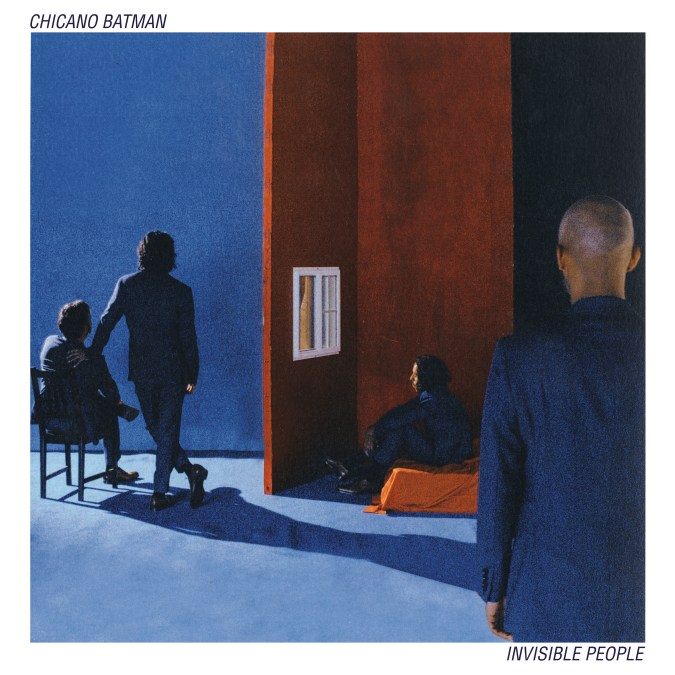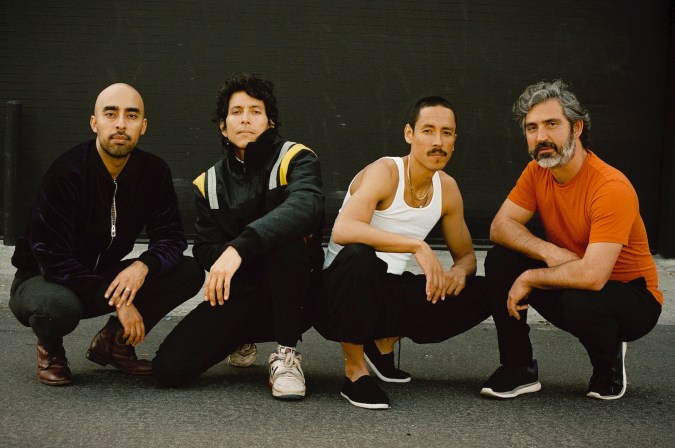For Latinxs or any minority group, it seems that it’s never just about the music. There are always stereotypes, expectations and assumed responsibilities when it comes to presenting their art. When an artist presents us with a new creation, there are assumptions that it has to display heritage, Latinidad and even social commentary for it to exist. What would you do in these circumstances? If you’re the four members of the Los Angeles, California band Chicano Batman, the answer is to let go and dedicate yourself to the music.
According to Chicano Batman, consisting of vocalist Bardo Martinez, guitarist Carlos Arévalo, bassist Eduardo Arenas and drummer Gabriel Villa, they’re done talking about the sociopolitical climate and ready to spread some heartfelt emotions. There’s a good reason why the band wants to move past their image as Latinxs calling out the Trump administration on its mistreatment of minorities. Since forming in 2008, the band has made their life and identity their primary aesthetic concern, giving nods to the Latinx culture in their lyrics as well as the music itself, as heard on their 2009 eponymous debut and 2014’s Cycles of Existential Rhyme. During this period, the band began making a name for themselves as an incredible live act, something they have displayed while sharing the stage with such acts as Jack White, Alabama Shakes and Portugal The Man, to name a few; as well as appearing in internationally renowned festivals like Coachella, Bonnaroo and Lollapalooza.
However, it was 2017’s Freedom Is Free which made Chicano Batman synonymous with Latinx protest and kept them as so throughout the past few years. A warm call to resistance, Freedom Is Free dropped just as President Donald Trump got inaugurated as the 45th president of the United States, and the title track became a sort of soulful resistance anthem, a celebration in the face of horrors, and a call not to let our guards down. It also became a constant subject in every interview the band conducted in the next three years. One can imagine how tiring that became.

Indeed, the members of Chicano Batman tell Remezcla, on a conference call during the global lockdown, ”we don’t call it ‘quarantine,’ we call it ‘spending time with our family,’” says Martinez. He continues to share that things have always been this way for minorities. “We’re artists,” says the vocalist. “It doesn’t matter the world situation, we’re just playing our music, whether it’s wartime or peacetime.” With that in mind, Invisible People marked a shift from their message to one of good feelings, bringing us music that can be bumped loud on a car or in your headphones. Described by someone close to the band as psychedelic G-funk, they take the low-hung beats of the South Central hip-hop genre pioneered by Dr. Dre, DJ Quik and Daz Dillinger, and mix them with the sonic experimentations of the late ‘60s California rock scene. For the band itself, the album represents something of a deeper transformation.

Their new era started with a new sound. “We know how to play grupero, Los Angeles Negros, Los Pasteles Verdes, all that stuff,” says Eduardo Arenas. “We can do that type of shit and we do it well. But we’re trying to evolve and push the limit not only of our music and our art but also as Latinos and humans existing in this world.” Carlos Arévalos continues. “Everybody realized that [the best approach was] bringing our different perspectives together to create something fresher than what we have been doing in the past and it was exciting for us. If I laid back and played what I was comfortable with, the result wouldn’t be fresh and different. It was about limitless possibilities and that made everything new for us.”
To capture their new sound appropriately, they went through a short list of producers the label provided for them but decided to work with Freedom Is Free producer Leon Michels again. In the words of Arévalos, “He knows what’s fresh, he has great gear, he’s an amazing arranger, and he knows our sound. So, we spoke to him about the ideas we wanted to try out [to not repeat what we had done in Freedom Is Free] and he was on board.” Another important piece of the Invisible People puzzle is Shawn Everett, a Grammy-winning mixing engineer known for his work with Kacey Musgraves, among others. They soon found another kindred spirit.

Invisible People is an album that hits hard with‘90s recalling hip-hop, ‘80s new wave and the best psych rock around today. The performances are tight and raw without sacrificing soul or attitude, which go from the cloudy sunshine of “Color My Life” to the unstoppable groove of “Blank Slate” to the up-tempo and synthetic “Polymetronomic Harmony,” to the spacey lowrider beat of “Moment Of Joy.” This range was something they intentionally wanted to bring in reaction to music “you’ll find in Spotify or iTunes playlists,” according to Martinez. “A lot of it feels tame, like it’s missing attitude. That music is cool, I like it, but I wouldn’t want to listen to it all the time. For us, it’s about how bumping the track is, if it makes your head bob. That was always our test [for these songs],” Arévalos continues. “This wasn’t a bedroom record. That’s a beautiful way to make records, but this is four people playing at the same time, in the same room, trying to get that take that’s going to make the album and I think that’s how we were able to bring that spice in. Not a lot of bands play together [in the studio] anymore.”

Lyrically, Chicano Batman tried to bring a more uplifting vibe than before. For Martinez, this is something he carries in his blood. “My mom is Caribbean, bro. Es una negrita. Puro grito y baile y bailongo y sabrosura. That’s how I grew up, bro. I can’t help but feel that way. Since I was a little kid, I’ve been battling with society. I didn’t relate to a lot of my classmates because they didn’t feel as happy as I did, and you learn it’s different for everybody to deal with capitalism, colonialism and all this shit in society. It’s how I deal with things.” The title track brings back their socio-political commentary; speaking about minorities being invisible for so many people. “I think the problem lies in trying to figure out what to call somebody. ‘Where do you come from? Where’s your family from?’ And that’s the first thing you ask somebody when you’re having a normal conversation. That’s disrespectful. We don’t see who we are. We just see our blackness or if you’re Latino or white. And all that shit is bullshit! That’s the biggest fucking lie that we are all following. Everyday we’re following this shit. We all say it.”
Although these kinds of themes are inevitable when it comes to addressing our day to day lives, the members of Chicano Batman would like you to know they are not the dissident Latinx voice of the Trump administration. “Putting out a record during Trump’s inauguration was tough on us because we went for the political thing with our music and our flavor and our style,” says Arenas. “But we have always been about that: Truth, awareness, peace, love and some badass beats. There’s always going to be some kind of crisis, you know? We’re still going to do what we do,” Martinez adds. “We did [Freedom Is Free] and we got tired of people asking us about the election and this and that, but that shit wasn’t even about that. Those lyrics that I wrote were not about Trump. This shit has always been like this.”
“With Chicano Batman we came out the door like, ‘Yo, we’re raza and this is what it is, this is who we are,’” he continues. “It’s hard for some people to either take us seriously or automatically put us in the Latin section. We’re just about the freshness, y’all! We want to make music that’s dope, relevant that you would want to bump in your car.”
Listen to Invisible People here:




